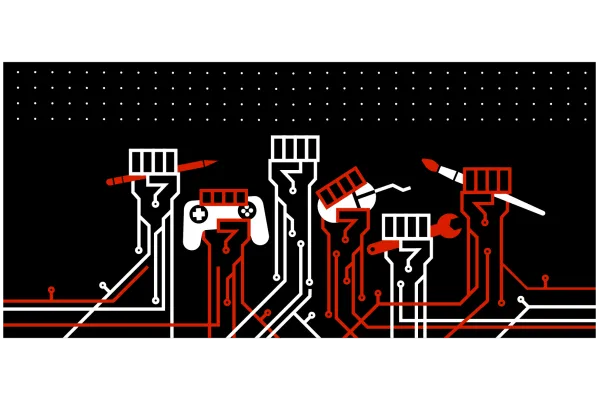CODE-CWA Newsletter: July 16

“One amazing result of our union going public has been seeing other underground tech unions inviting us to their organizing meetings. Tech is an industry ripe for unionization. We’re excited to be the largest majority tech union in the country, but we’ll be even more ecstatic to pass that torch onto the next tech workers to unionize!”
Kathy Zhang, a senior manager of audience analytics at the New York Times.
For the past six years, newsrooms have been unionizing at a rapid pace, making the media one of the labor movement’s bright spots. Most of those unions, however, consisted solely of journalists and editorial workers, but that’s changing now. Tech workers at media companies are now joining other unionized workers in their workplace in order to consolidate worker power. In this context, the NYT Tech Guild marks an important strategic step for the labor movement in two powerful industries.
Six months into 2021, workers have already organized 9 new CWA tech unions, bringing in 2,000 new union members.The tech sector has seen a surge of union activism that would have been unthinkable just a few years ago. Tech workers increasingly view organized labor as a way to advocate for contractors in riskier positions, improve workplace conditions without fear of retaliation and CODE-CWA has been central to organizing tech workplaces.
In this newsletter, we give you the latest on tech worker organizing at the Atlantic and New York Times; report on unfair and exploitative practices at the tech and gig companies Google and GoPuff; and take you to how these trends are playing out around the world, specifically in the Philippines and Iceland. Through our support of workers across the tech, games, and digital industries we have seen a cultural shift as workers turn to each other to bring the change they seek. This commitment to building democracy in the workplace will impact all of us.
Are you looking to organize your workplace? Reach out. We are ready to organize with you.
Events
On July 17, join us at a 12PM PST class where we talk about organizing union basics, CWA organizing models, and some key ways to connect with co-workers through organizing conversations. Training is active and participatory. This is Class 1 in a series, perfect for beginners. Sign up here. You can also join us on Jul 18 at a 10AM PST class where we talk about how to build a strong organizing committee, maintain it, and build a strong foundation from which you can run a successful union campaign.This is Class 2 in a series. Ideally students should take Class 1 first, but it's not required. Sign up here.
While you're signing up for classes don’t forget to check out our new “Organizing Training” page on the CODE-CWA website. You’ll find a training program overview, additional resources to strengthen your organizing study, a briefing on your right to organize and more! Check it out here.
Worker News
Shrugging Off Anti-Union Campaign, New York Times Tech Workers Are Making History
NYT workers plan to ride the media union wave right onto a bigger wave of tech organizing. Newsrooms have been unionizing with guilds such as the NewsGuild, but these are primarily for journalists and editors, and tech workers have always been left out. This led to the creation of the NYT Tech Guild, which after two years has become the largest tech union in the US. Despite this milestone, they face anti-union campaigns from the New York Times. Even though they have not been recognized, they are optimistic for the future. Labor reporter Hamilton Nolan writes, “virtually all of the media union drives in recent years that have faced anti-union campaigns have succeeded anyhow.” Read more on In These Times.
Supermajority of Atlantic Workers Sign Union Cards
Journalists at The Atlantic announced July 12 that they officially won union recognition after a “card check” showed “an overwhelming majority of editorial employees” had signed cards signaling support for the union. Atlantic staff is looking forward to sitting down with management and negotiating a fair contract. As a unionized newsroom, they hope to “better secure the intellectual diversity essential to The Atlantic, ensure that staffers are fairly compensated and protected,” and make certain that “our voices are heard when big decisions that affect us are made.” The Atlantic has formed the Atlantic Union in collaboration with the NewsGuild of New York. Journalists at The Atlantic announced the formation of a union on June 7. Staff writer David A. Graham said “Our supporters include some of our longest-tenured staffers and newest colleagues, from the entry level to veteran stars. Read more here.
‘The Worst of Both Worlds’: GoPuff’s Gig Workers Have Bosses and No Benefits
“They're demanding guaranteed hours, that managers stop directly controlling their working conditions, to be paid the advertised amount (roughly $18 to $20 an hour on Indeed.com) after gas and other expenses, and to remove the mandatory arbitrary clause from their contracts, which prevents them from pursuing legal action”, says Gurley. GoPuff is a rapidly expanding gig economy company that delivers convenience store items without a brick and mortar store. Employees are generally unhappy with the working conditions and are petitioning for change with signatories from over 77 cities. The working conditions are advertised like gig work, where employees are able to set their own hours and work freely, however, the reality is very different. Employees are given only a couple of minutes every week to choose a schedule and can be fired for missing any shift. Contract workers say managers have total control over them and there is rampant favoritism. Read more on VICE.
Google Employees Angered By Search Giant's 'hypocritical' Remote Work Policies
Google wants to implement a physical-remote hybrid work policy, with potential salary cuts for those relocating. The company has faced backlash from its employees with one saying “Google has been ‘vague and unhelpful’ about the process for most of the year”. The company received further scrutiny when senior vice president Urs Hölzle announced that he plans to work remotely from New Zealand this year. This has raised concerns of double standards where senior executives are not bound by the same rules. Read more CNet.
Google’s latest diversity report shows jump in departures among women of color
92 percent of Google’s US workforce is White and Asian which is why Google is looking to diversify. However incidents such as the firing of Timnit Gebru has led to Google “having particular difficulty retaining women of color”, says Lyons. Despite this, the company still plans to double the number of black employees by 2025. Read more on the Verge.
Tech contractors are organizing and facing violent threats in the Philippines
In the Philippines, outspoken individuals get branded as anti-government and can be incarcerated or even killed. Mylene Cabalona is one such individual and fears for her safety. As The president of a workers’ association called Business Process Outsourcing Industry Employees’ Network (BIEN), she primarily advocates for employees of the Business Process Outsourcing (BPO), one of the Philippines’ largest employers. Cabalona and others like her want reforms for working conditions and an end to violent attacks. As Elliot says, “Activists said they want big technology companies and others who benefit from the Philippines’ BPO sector to take an interest in the abuses that are going on in their supply chain.” Both CWA and CWA President Chris Shelton have strongly supported union workers in the Philippines and continue to stand with workers. Read more on Rest of the World.
Four-day Week 'an Overwhelming Success' In Iceland
In 2015, Iceland pioneered the largest ever trial of a shorter working week. More than 2500 individuals reduced their working hours by up to 12 percent, during a 4 year period, with people feeling happier and more relaxed in general. Because of the overwhelming success of this trial, companies like Unilever New Zealand now want to give their staff “a chance to cut their hours by 20% without hurting their pay.” Read more on BBC.
This Week in Labor History
July 14, 1877: The Great Railroad Strike was America's first major rail strike. It was a result of two wage cuts made by the Baltimore and Ohio railroad in the same year. This lasted almost two months and led to state militia and eventually federal forces suppressing the strike.
Song of the Week
Hey, Mean Mr. Bossman by Spongebob Squarepants
Hey, Mean Mr. Bossman,
I'm a-quittin' this here job
You've been outside gettin' tan
And I've been gettin' robbed
My life is worth so much more
Than a dollar 'n' ten an hour
Wakin' up by the quarter to four
And I'm startin' to turn sour
So, Hey, Mean Mr. Bossman,
I'm a-quittin' this here job
I'm sick of eatin' old bran
And living like a slob
You've got me living like a slob!
CWA Video Game Workers Stand with SAG-AFTRA
Workers at Bethesda Game Studios Achieve Union Recognition with CWA becoming First Wall-to-Wall Union at Microsoft


